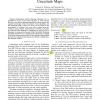211 search results - page 5 / 43 » Expressive Planning and Explicit Knowledge |
COLING
2000
13 years 7 months ago
2000
s; these annotations provide an abstract description of the effects of particular linguistic choices, allowing the planner to evaluate these choiceswithout needing any linguistic k...
ICRA
2006
IEEE
14 years 1 months ago
2006
IEEE
Abstract— Randomized motion planning techniques are responsible for many of the recent successes in robot control. However, most motion planning algorithms assume perfect and com...
ATAL
2010
Springer
13 years 8 months ago
2010
Springer
We present a new approach for finding generalized contingent plans with loops and branches in situations where there is uncertainty in state properties and object quantities, but ...
SP
2008
IEEE
13 years 7 months ago
2008
IEEE
This paper provides a way to specify expressive declassification policies, in particular, when, what, and where policies that include conditions under which downgrading is allowed...
PAKDD
2005
ACM
14 years 26 days ago
2005
ACM
This paper presents the advances in subgroup discovery and the ways to use subgroup discovery to generate actionable knowledge for decision support. Actionable knowledge is explici...

